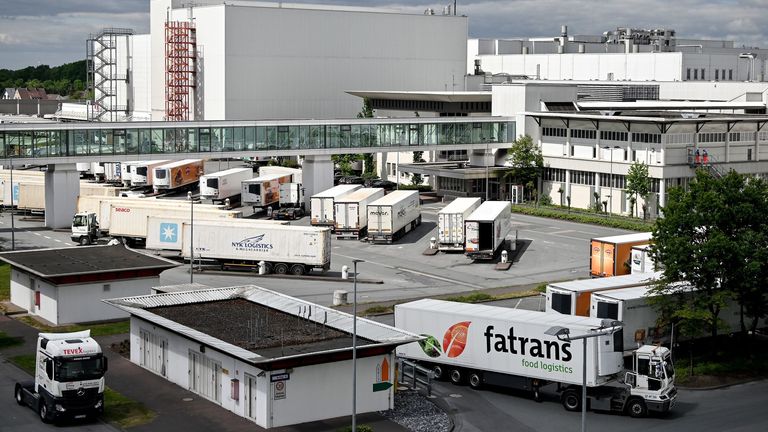Coronavirus: R number jumps to 1.79 in Germany after abattoir outbreak
A public health institute confirmed the rate was now far above what is needed to contain the outbreak over the longer term.
Sunday 21 June 2020 18:52, UK
The coronavirus reproduction rate, known as the R number, has jumped to 1.79 in Germany.
The Robert Koch Institute (RKI) for public health confirmed the rate was now far above what is needed to contain the outbreak over the longer term.
The R number equates to how many people, on average, will be infected by each person who has COVID-19.
If R is above 1, an outbreak can grow exponentially, but if it is below 1, the number of infections shrink and coronavirus can be brought under control.
An R of 1.79 means 100 people who get the virus will infect 179 others.
The latest rate, published in RKI's daily situation report, compares with a value 1.06 on Friday.
The development is a setback for a country viewed as doing much better compared to many other EU nations in the pandemic due to its early and widespread testing procedures.
The increase in R comes after hundreds of workers tested positive for COVID-19 at an abattoir in northern Germany this week, prompting the closure of local schools and an urgent investigation.
Toennies, one of Germany's biggest meat processors, said it had stopped slaughtering on Wednesday and was shutting the abattoir in stages.
:: Listen to the Daily podcast on Apple Podcasts, Google Podcasts, Spotify, Spreaker
More than 1,000 workers were tested and a total of 657 people tested positive for coronavirus, DW News reported.
Toennies co-owner Clemens Toennies has apologised.
There have also been local outbreaks in locations such as logistics centres and refugee shelters.
Other infections have been linked to church services and family parties.




